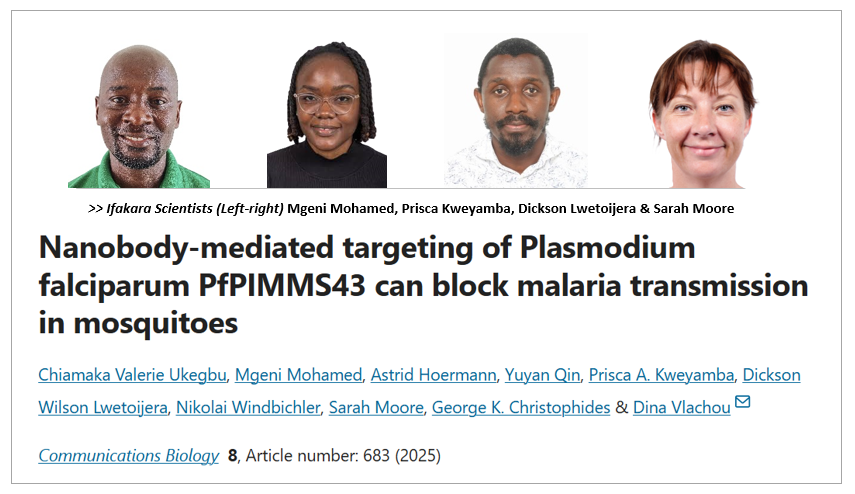
BREAKTHROUGH: Scientists find way to stop malaria inside a mosquito

Researchers at the Ifakara Health Institute and the Imperial College London have developed a promising new approach to block the spread of malaria by targeting a key protein that helps the parasite to survive inside a mosquito.
Targeting a key parasite protein
In their study results published recently on Communications Biology, the team focused on a protein called PfPIMMS43 – which helps the malaria parasite to survive inside a mosquito by hiding from its immune system. Earlier research shows that when this protein is targeted by specific antibodies, the parasite's growth inside the mosquito can be reduced.
They used nanobodies—small, powerful antibodies derived from llama immune cells—to block PfPIMMS43. By doing so, they were able to block the parasite’s development inside the mosquito, effectively stopping it from reaching the next stage of its life cycle.
How the malaria parasite works
The malaria parasite, plasmodium falciparum, goes through a key stage in its life cycle when it changes from one form (called an ookinete) to another (called an oocyst) inside a mosquito. This step is important for the parasite to complete its life cycle and continue spreading. Interrupting this process provides a strategic point for stopping malaria transmission.
Encouraging results from lab and field tests
The nanobodies were tested against both laboratory and field strains of the parasite in two major mosquito species, anopheles coluzzii and Anopheles gambiae. Results showed a strong reduction in both the intensity and prevalence of infection.
Researchers also identified the specific region of the PfPIMMS43 protein that the nanobodies target, which appears to remain largely unchanged across different parasite strains, making it a strong candidate for transmission-blocking efforts.
A bold strategy of using genetically modified mosquitoes
Building on their findings, the researchers propose an innovative long-term strategy: genetically modifying mosquitoes to produce PfPIMMS43-targeting nanobodies themselves. With the help of gene drive technology, this trait could be passed down through wild mosquito populations. The goal is to prevent the malaria parasite from surviving and developing inside the mosquito, thereby stopping transmission at its source.
"These findings establish PfPIMMS43 as a promising transmission-blocking target. To enhance malaria control and elimination efforts, we propose an innovative strategy in which genetically modified mosquitoes express PfPIMMS43-specific nanobodies in their midguts and spread this trait in wild mosquito populations via gene drive technology," concluded the scientists.
Ifakara scientists behind the discovery
Ifakara Health Institute scientists who contributed to this study include Dr. Mgeni Mohamed, Prisca Kweyamba, Dr. Dickson Lwetoijera, and Dr. Sarah Moore. The lead author is Chiamaka Valerie Ukegbu from the Imperial College London.
Other contributors from the Imperial College London are: Astrid Hoermann, Yuyan Qin, Nikolai Windbichler, George Christophides, and Dina Vlachou.
Read the publication here: https://www.nature.com/articles/s42003-025-08033-8#Abs1
